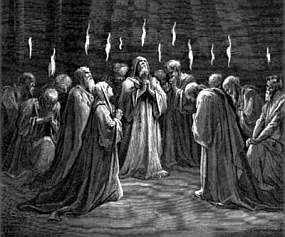It is with great humility that I share that God has richly blessed me through the lives of great Christian people I have known personally. It is with great sadness also that I confess that I have not known many such people, far fewer than I should, and not through any fault of my own.
That unique person who seems to walk with God in some deep relationship that appears unfathomable is a rarity. More than anything else, I wish I could be one of those people, though it seems like my own failings and the circumstances I encounter daily conspire against me. I still hope though.
In meditating on these great Christian people I have known, one characteristic shines brightly: Every last one of them always tried to see the best in people they encountered. It didn’t matter if those people they encountered were worthy of being thought of as best in anything,  those great Christian people treated them as if they were.
those great Christian people treated them as if they were.
If there is a sign of our times, it’s that we always tend to think the worst of others. We see them only as foes, as sinners, as people of low thinking, idiots, fools, perverts, jerks, libertines, and a host of other labels easily applied and—potentially—accurate.
But great Christians choose not to see people that way. They see them as they could be. They see them as they should be. They offer respect when none is deserved. And they respond to people in such a way that their caring and love helps raise others to the level of vision those great Christians possess. Great Christians elevate everyone around them and make them want to be better people.
I knew a great Christian once who was certainly not someone who at first glance would seem to be an exemplar of distinction. In a crowd, you would miss him. He didn’t talk fast or use big words. He never got beyond a high school education, and he lived in some podunk town off the beaten path. But I watched that man embrace a known drug dealer one day and the drug dealer called him “sir.” That great Christian knew who and what that man was and loved him anyway. I saw tears in that drug dealer’s eyes, and they were there because he saw past the insignificance of a great Christian’s exterior and saw Jesus Christ in all His glory in that great Christian’s interior. We all knew something happened to that drug dealer right then and there. He was convicted by Christ in another, all without a word needing to be spoken. Because of love. And because a simple man of God chose to reach out to the one person everyone else in the room avoided.
Great Christians don’t see the drug dealer. They see the person in pain who is lost and in need of Jesus. And those great Christians become Jesus to him or her.
We live in an age where the defense of our position, our rightness, our superiority over perceived foes and infidels, is the characteristic most admired in others. Yet the true nature of God is antithetical to this. Instead, He works through great Christians who are willing to see more in others than a practice or ideology opposed to their own.
Do you and I see the best in others? Does our presence raise up others? Are we winsome and attractive? Or do we scare off the spiritually needy with our need to be portrayed as paragons of truth and righteous ire?
When you and I were nothing, Jesus reached out to us and made us something. How can we offer anything less to those people who most need Him?


